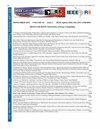Hybrid Attack Optimization Supported Enhanced Deep Learning to Facilitate Power System Event Detection using PMU Data
IF 1.3
4区 工程技术
Q3 COMPUTER SCIENCE, INFORMATION SYSTEMS
引用次数: 0
Abstract
Accurate event detection is crucial for initiating control and protection measures in power systems to ensure enhanced and reliable operation. Phasor measurement units (PMUs) play a vital role in various functional aspects of power systems, including state estimation and intelligent protection algorithms. However, the authenticity of real-time data from PMUs must be verified before feeding it into applicable real-time algorithms to prevent undesirable or erroneous operations. This paper aims to present an efficient preprocessing methodology for identifying unwanted, incorrect, missing, or noisy PMU data to facilitate robust event detection algorithms. The proposed methodology leverages real-time data-driven deep learning techniques for authenticating incoming data. Given the high sampling rate of PMUs, the presence of extraneous data can lead to false event detection, necessitating reliable data preprocessing. Challenges identified in existing literature, such as the limitations of Steady State (SS)-Local Outlier Factor (LOF) in event detection and classification, issues with detecting line tripping and inter-area oscillations, computational and bandwidth requirements for micro-PMU installations, and false alarms resulting from inaccuracies in frequency ramp rate determination, are addressed. To overcome these challenges, this research proposes a deep learning approach that utilizes modified Deep Convolutional Neural Network (CNN) and Long Short-Term Memory (LSTM) classifiers to classify and extract features from PMU data, enabling highly efficient detection of disturbances in transmission lines. Additionally, a hybrid attack optimization (HAO) technique is employed to enhance convergence rates, accuracy, and efficiency. Performance evaluation of the proposed system is conducted by calculating and assessing disturbances generated by power lines using metrics such as accuracy, precision, recall, System Average Interruption Duration Index (SAIDI), and System Average Interruption Frequency Index (SAIFI).支持混合攻击优化的增强深度学习,促进使用PMU数据进行电力系统事件检测
准确的事件检测对于启动电力系统的控制和保护措施,以确保电力系统的增强和可靠运行至关重要。相量测量单元(pmu)在电力系统的各个功能方面发挥着至关重要的作用,包括状态估计和智能保护算法。然而,来自pmu的实时数据的真实性必须在将其输入适用的实时算法之前进行验证,以防止不良或错误的操作。本文旨在提出一种有效的预处理方法,用于识别不需要的、不正确的、缺失的或有噪声的PMU数据,以促进鲁棒事件检测算法。所提出的方法利用实时数据驱动的深度学习技术来验证传入数据。鉴于pmu的高采样率,外来数据的存在可能导致错误的事件检测,需要可靠的数据预处理。解决了现有文献中发现的挑战,例如稳态(SS)-局部离群因子(LOF)在事件检测和分类中的局限性,检测线路跳闸和区域间振荡的问题,微型pmu安装的计算和带宽要求,以及频率斜坡率确定不准确导致的假警报。为了克服这些挑战,本研究提出了一种深度学习方法,该方法利用改进的深度卷积神经网络(CNN)和长短期记忆(LSTM)分类器对PMU数据进行分类和提取特征,从而能够高效地检测传输线中的干扰。此外,采用混合攻击优化(HAO)技术来提高收敛速度、准确性和效率。通过计算和评估电力线产生的干扰来对拟议系统进行性能评估,使用诸如准确性、精度、召回率、系统平均中断时间指数(SAIDI)和系统平均中断频率指数(SAIFI)等指标。
本文章由计算机程序翻译,如有差异,请以英文原文为准。
求助全文
约1分钟内获得全文
求助全文
来源期刊

IEEE Latin America Transactions
COMPUTER SCIENCE, INFORMATION SYSTEMS-ENGINEERING, ELECTRICAL & ELECTRONIC
CiteScore
3.50
自引率
7.70%
发文量
192
审稿时长
3-8 weeks
期刊介绍:
IEEE Latin America Transactions (IEEE LATAM) is an interdisciplinary journal focused on the dissemination of original and quality research papers / review articles in Spanish and Portuguese of emerging topics in three main areas: Computing, Electric Energy and Electronics. Some of the sub-areas of the journal are, but not limited to: Automatic control, communications, instrumentation, artificial intelligence, power and industrial electronics, fault diagnosis and detection, transportation electrification, internet of things, electrical machines, circuits and systems, biomedicine and biomedical / haptic applications, secure communications, robotics, sensors and actuators, computer networks, smart grids, among others.
 求助内容:
求助内容: 应助结果提醒方式:
应助结果提醒方式:


